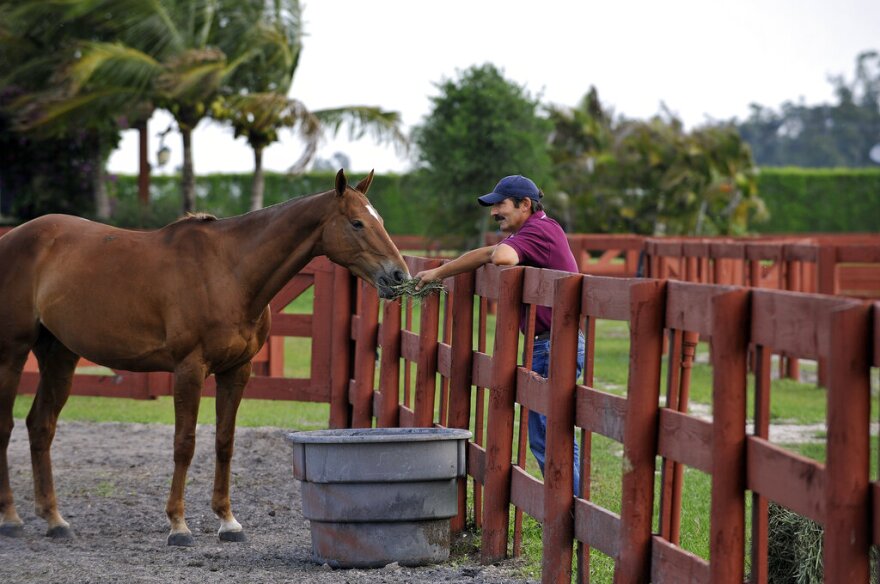WELLINGTON, Fla. – For years, this village has been a mecca for the equestrian community, hosting competitions and tournaments at the highest levels for polo, dressage and jumping. With the recent removal of 96 acres from the Equestrian Preserve and increasing competition from Ocala in central Florida, that could all be at risk.
The land is being rezoned to make way for hundreds of homes and an expansion of the golf course, as well as forcing the relocation of the beloved equestrian showgrounds to a separate plot of land, following a highly contested vote in the village council last month.
Although the removal of 96 acres from a 9,000-acre preserve may not sound like much, there's a real fear among members of the equestrian community here that it will open the door for new developers to come in and take even more land from the preserve.
Former representative on the equestrian preserve committee, Carlos Arellano, said in a recent interview that the equestrian community’s largest concern since the project was first proposed in 2022 is that it may create a domino effect.
“Every future developer will be looking to take a piece out of the preserve,” Arellano said.
Arellano, who has been a part of the polo community in Wellington since he immigrated from Colombia in 1978, had been appointed to the board in 2022 by Council Members Michael Drahos and John McGovern. However, he and another member of the committee were removed from their positions at the behest of Wellington Lifestyle Partners (WLP), the developers behind the project.
WLP’s lawyer Daniel Rosenbaum requested that they be removed from the committee for speaking out against the project at past hearings, citing their “conduct in relation to the applications” as reason for their removal.
Many in the community are concerned that the “Wellington 4.0’” development was simply a ploy by real estate developers to change the area’s zoning for commercial use to increase the land’s value and then turn it over for profit. This concern is a result of the confusion that surrounds the funding of the project, with WLP not making it clear who is funding the project, or how they’re funding it.
Marc Ganzi, CEO and President of DigitalBridge as well as a polo player and land owner in Wellington, raised this concern at the final hearing.
“Usually with projects costing hundreds of millions of dollars the funding is understood,” said Ganzi at the hearing. “We don’t want to have a semi-funded, semi-built project that they’ll walk away from.”
Ganzi also emphasized the biggest risk that the proposal would provoke: Wellington diminishing its brand as the winter equestrian capital of the world, something that may become a real byproduct of the council’s decision. And with Ocala’s equestrian scene expanding and becoming more prominent than it has ever been before, critics are concerned that the new showgrounds won't be up to par.
Ocala has always had a rich equestrian history, but with the World Equestrian Center opening in 2021, it has taken a huge step forward and is starting to pose serious competition to Wellington’s equestrian scene. The World Equestrian Center isn’t just any showground, it’s the largest in the world at nearly 400 acres, and has made it so that people can keep their horses there year round instead of just in-season.
In contrast, there is much confusion surrounding the future of Wellington’s equestrian showgrounds, such as whether or not their move to their new location will be a success, whether the new facilities will be good enough, and the biggest question of all: Who will be the new owner?
Global Equestrian Group (GEG), is a Danish company that currently owns and operates the Palm Beach International Equestrian Center in Wellington. Sources familiar with the negotiations, however, say that after less than three years of ownership, they’re ready to sell the equestrian center, raising even more questions and doubt as to where the future of Wellington’s equestrian culture may lie.
The majority of members on the Village Council, however, weren’t concerned with how passing the proposal would affect Wellington’s equestrian scene.
“For the future of our city, I cannot let the search for perfection be the enemy of good,” said councilman John T. McGovern at the meeting, announcing he’d be voting in favor of the proposal.
Vice Mayor Michael J. Napoleone was the sole dissenting vote, as the council ruled 4-1 in favor of removing the land from the preserve for commercial use. Napoleone said he was unhappy with what the proposal could do to Wellington.
“For me and many others I’ve spoken to,” Napoleone said, “that’s not what Wellington is and that’s not what we want Wellington to become.”





